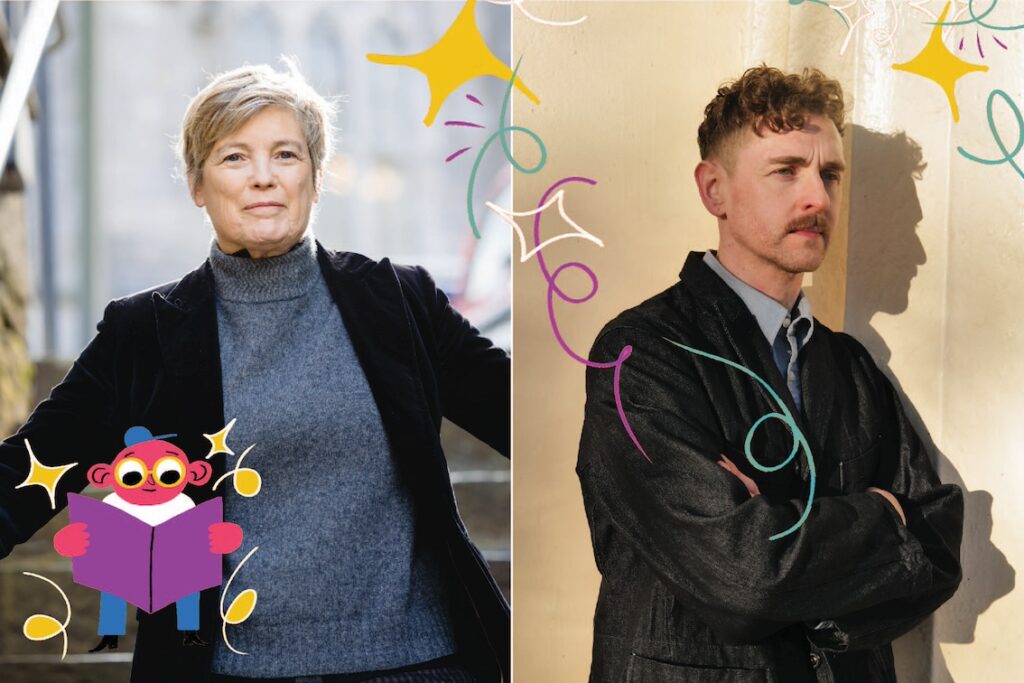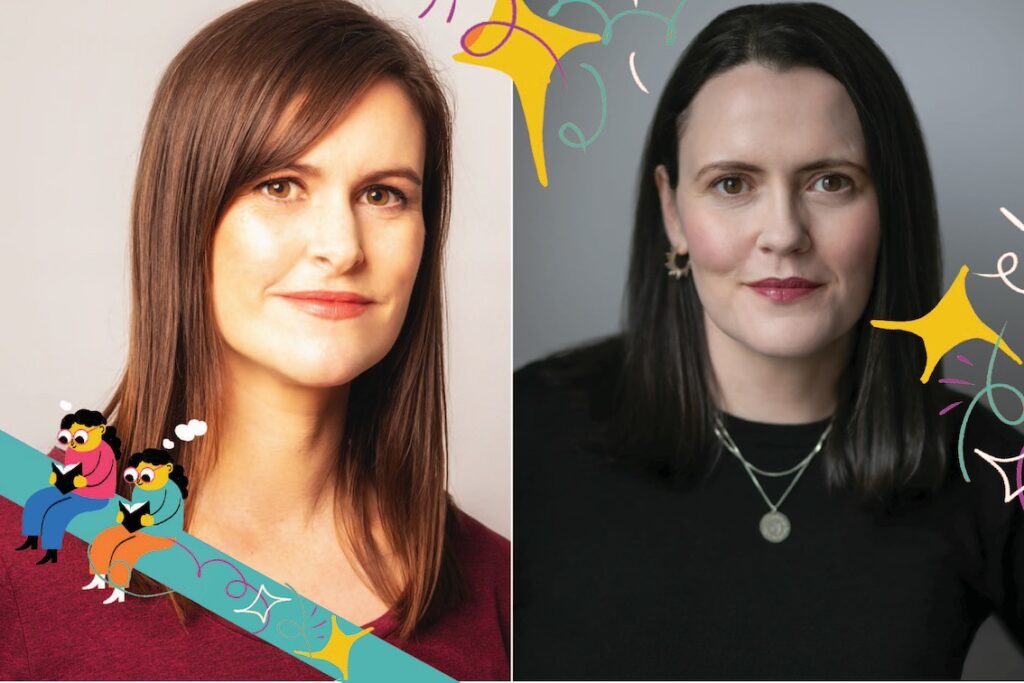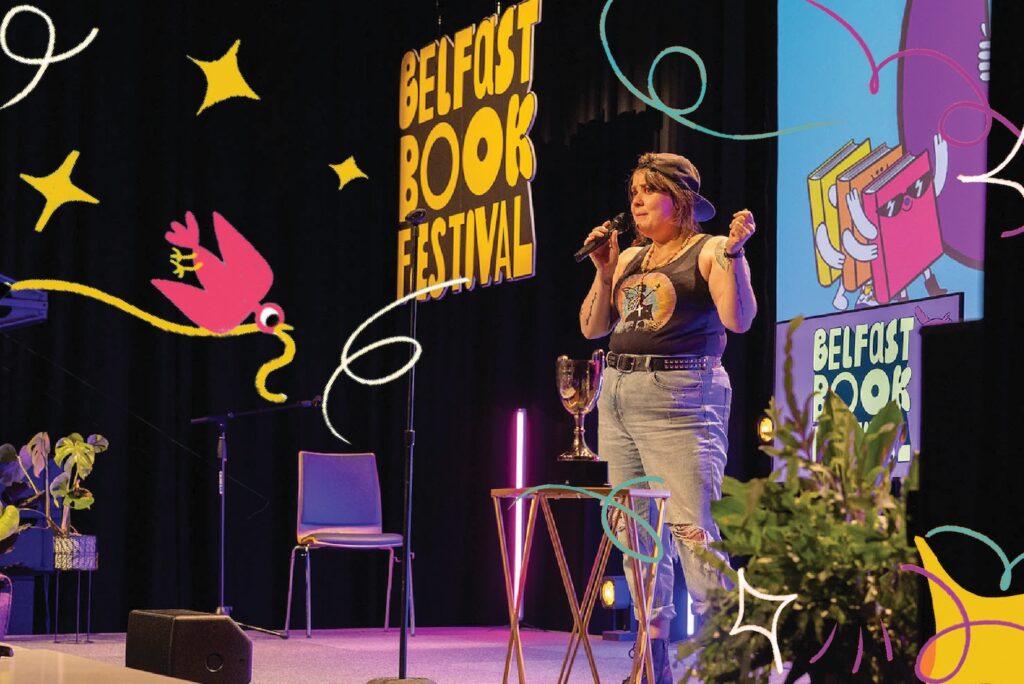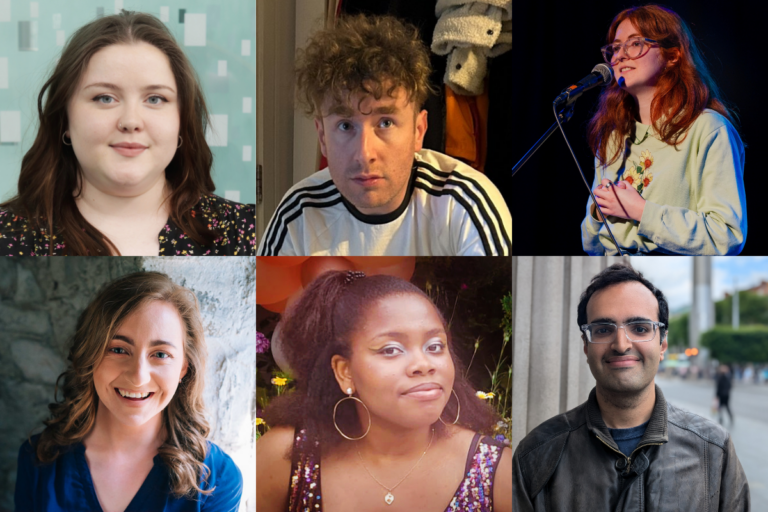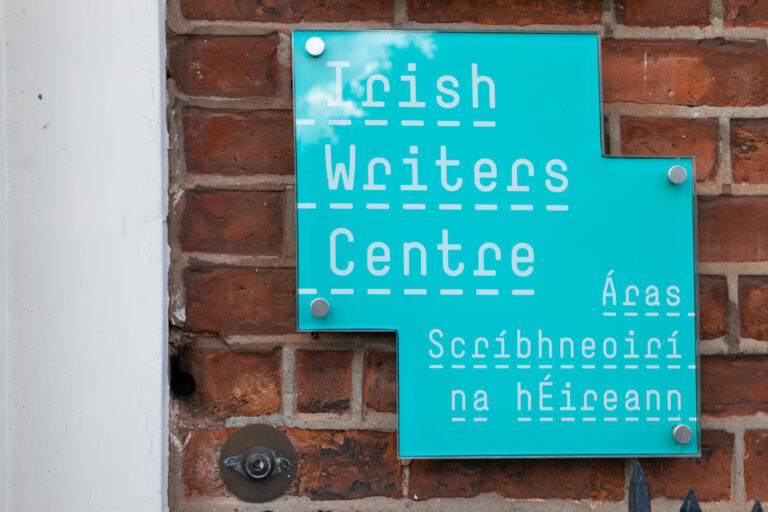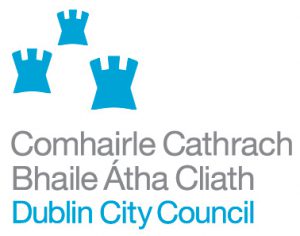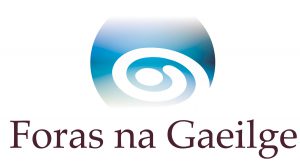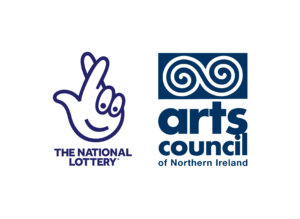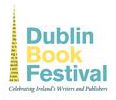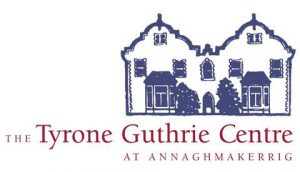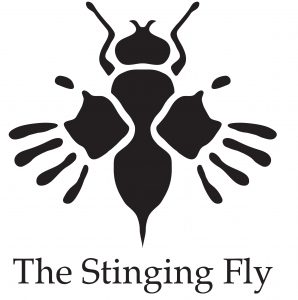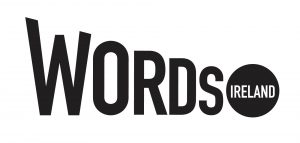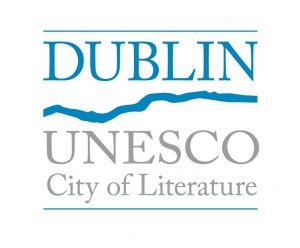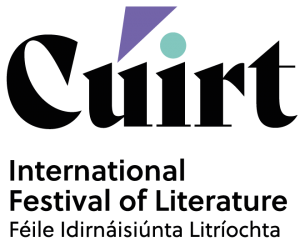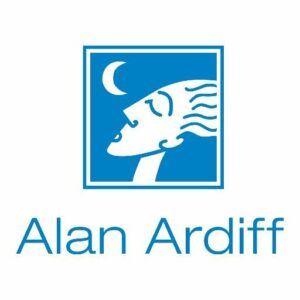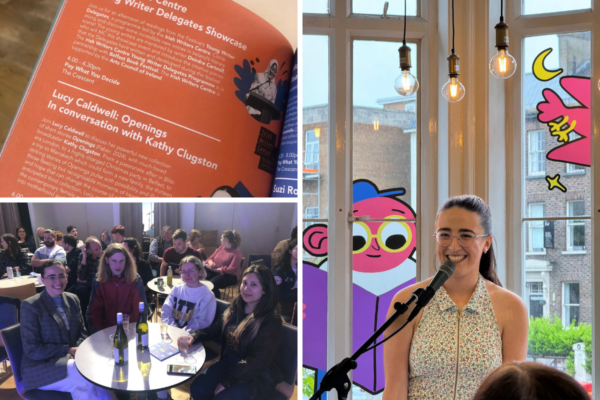
18 June, 2024
Our Young Writer Delegates look back on Belfast Book Festival 2024
Last month, writers and book-lovers from far and wide travelled to Belfast for Belfast Book Festival 2024. From 6-10 June, attendees were treated to a week full of readings, conversations, poetry slams, which showcased new voices, diverse writing, Irish and international writing talent.
Among the attendees were our IWC/Belfast Book Festival Young Writer Delegates, Jasmin Awoodun, Mary Dunne, Finn Dunne Leavy and Cara Leahy. As part of the festival, our Young Writer Delegates took part in their very own showcase event where they got the chance to perform some of their work, developed with their local writer-mentor Deirdre Cartmill, to a packed audience in The Crescent Arts Centre.
Each year, the delegates attend events of their choice and write a review of their experience; here are the reviews our delegates wrote up for #BBF2024!
Late Night Art: Our Queer Lives with Katherine O’Donnell & Diarmuid Hester
in conversation with Neil Hegarty
Reviewed by Jasmin Awoodun
After a busy first day at Belfast Book Festival, my final event of the evening was Late Night Art: Our Queer Lives, featuring Katherine O’Donnell and Diarmuid Hester in conversation with Neil Hegarty. I picked up my complimentary beverage, found a table near the front, and rearranged the art supplies provided, ready to create a masterpiece.
As it turns out, I haven’t studied art since I was seventeen and quickly realised that my anticipated masterpiece would be little more than a doodle. But that didn’t take away from the experience, which was like nothing I had partaken in before. As O’Donnell herself remarked, there was an atmosphere akin to attending a salon.
O’Donnell and Hester discussed and read from their respective books, Slant (New Island Books, 2023) and Nothing Ever Just Disappears (Allen Lane, 2023). They mused on the use of the word queer and how it has changed over time, as well as the importance of remembering the enormous struggles queer people have gone through to overcome discrimination. They also pondered the difficulties facing young queer people today, making sure to emphasise how those difficulties still exist, even if they don’t look the same as those experienced by queer people in previous decades.
A recurring theme, and one that Neil Hegarty made sure to address during the conversation, was finding a sense of home and belonging as queer people. This theme is present in both O’Donnell and Hester’s books, with characters finding new homes away from where they were born and building new lives for themselves there. As an English person living in Northern Ireland, this particularly resonated with me – I may not have moved as far as from Ireland to the US, as O’Donnell’s protagonist does, or from the US to France as in the case of Josephine Baker, a queer dancer, singer and actress whose true story features in Nothing Ever Just Disappears. But I felt that I was in good company.
Arguably the best and most unusual part of the event, though, was the way we were encouraged to draw along to the conversation. We had been provided with the extracts O’Connell and Hester were reading, and as I listened, I circled some phrases, blacked out others, tried to find new meaning in the words. I didn’t produce much of artistic merit, but engaging with the work in a different way made me think more deeply about every word, phrase and sentence.
We were also given a photograph of Josephine Baker. As I shaded it in various hues of red, I wondered about her life, how it had felt to be her. I’ll never know what was running through Baker’s mind as she left her adopted home of Paris to return to the US, and I was keenly aware of space and time separating me and this woman who died almost fifty years ago. Yet as Hester read and the pencil connected my hand to the paper, that distance seemed to lessen.
Womanhood & Experience with Eimear Ryan And Caroline Magennis
Reviewed by Mary Dunne
Having left my apartment in Cork at 6.30 on the morning of Thursday 6th of June to travel to the Belfast Book Festival, I was delighted to be welcomed to the Crescent Arts Centre—and at that moment, specifically, the cafe for some coffee. I quickly found myself re-energised as I met the Belfast Book Festival Team, our fantastic mentor Deirdre Cartmill and my fellow young writer delegates. This invigorating trajectory continued as I attended my first reading of the festival: Womanhood & Experience, a brilliant, eye-opening conversation between Eimear Ryan and Caroline Magennis.
The event began with readings from both authors. Eimear Ryan read from Chapter Twelve of her memoir The Grass Ceiling: On Being a Woman in Sport which is titled ‘Hurl like a Woman’ (but Ryan nicknames the ‘gender chapter’). Caroline Magennis read from the Prologue of her manifesto Harpy: A Manifesto for Childfree Women.
Before this event, I had read The Grass Ceiling in 2023, while I was playing intercounty football for Westmeath. The memoir came to me at a moment in my life when I was consumed by sports. The Intercounty Ladies Football and Camogie teams were playing out championship under protest to ensure that the LGFA and Camogie Association committed to a standardised charter for female players. It felt like this book came to me at the perfect time in my life, and at a time when the treatment of women, in particular at Intercounty level, was under a magnifying glass. Relating to Ryan’s experience as a young woman playing sports was one thing, but at the Belfast Book Festival, it was incredible to listen to Ryan discuss her memoir from the perspective of a writer. I felt very inspired—it was a wonderful collision of my sporting and writing worlds and they were meeting in a way that I never realised they could.
While I am not at the point in my life where I am seriously considering whether I want to have children or not, it was enlightening to listen to Magennis discuss her experience as a childfree woman. Magennis read from the prologue of her manifesto which recites her experience of being confronted by a man at a work event while she is in the middle of a conversation with a group of women. He asks, ‘Do you have kids at home?’ and when Magennis says that she does not, he follows up with the question, ‘But do you want them, soon?’ The implications behind his questioning are clear and while it isn’t surprising that women are placed under scrutiny that men rarely, if ever, have to face, the audacity to ask at all,—never mind with the added insult of interrupting a conversation and asking these questions in front of a group—is shocking to me. Magennis uses humour expertly to write about her experience. While a man may be condescending and belittling, assuming he knows a woman’s mind better than the woman herself, Magennis manages to portray how ridiculous this line of questioning is. She does not make light of the situation, but takes control of the narrative through humour—getting back to the story of a malfunctioning halterneck bikini is much more important than explaining life choices to a man.
While humour is clearly at work in Magennis’s manifesto, anger is also at the forefront. After the readings, Magennis and Ryan both discussed how anger played an important role in their works. Magennis spoke about anger being expressed mostly at the beginning of the manifesto and not being evoked as much as the manifesto continues. Meanwhile, Ryan discussed how anger was strongest in Chapter Twelve of her memoir. In the writing process, anger was at the forefront of the early drafts of this chapter, which discussed gender and the treatment of/attitude towards women playing sports. It became important to Ryan that she was not shouting at her readers, who having reached Chapter Twelve were most likely already on her side so throughout the drafting process, the anger was less explicit. However, as a reader, Ryan’s truthful writing about her experience enables the reader to feel the anger on all female sports player’s behalf, without Ryan having to ‘shout’ at her readers. The title of the chapter takes inspiration from ‘The Hurler’s Prayer’ which invokes the skills necessary to be able to say that you ‘hurled like a man; you played the game.’ Language in the sporting world is oftentimes exclusionary and with the title of this chapter, Ryan is reclaiming language to be inclusive where women have been sidelined. We can see this in the naming of the sports: ‘Ladies’ Football—to emphasise that despite playing Gaelic Football, we are, of course, still ladies; ‘Camogie’—to prevent any suggestion that it is the same sport as ‘Hurling,’ the male equivalent. Ryan, in discussion and in her writing, expertly reclaims language and analyses the language that surrounds sports.
Towards the end of the event when questions were opened up to the audience, we had a brilliant discussion on how to celebrate childfree women, without the typical milestones/events of baby showers and Christenings and first birthday parties. While Magennis suggested that the joy/pleasure of everyday life of being childfree and not having to use so much brain power and energy to care for children is enough celebration, the women in the room began brainstorming ideas to ensure that women are celebrated, regardless of whether they have children or not. It was a heartwarming moment that left me with a feeling of being united. It made me want to take ownership of being a woman and to ensure that I celebrate moments in my life and the women in my life, without requiring the stereotypical milestones to access celebration.
Caroline Magennis and Eimear Ryan’s discussion on ‘Womanhood & Experience’ was the perfect introduction to the Belfast Book Festival events. It set the standard for a wonderful week of discussing books and writing. It was an absolute joy to attend.
Poetry Slam
Reviewed by Finn Dunne Leavy
In crowded rooms, my eyes tend to default to windows. I say eyes tend to as opposed to I tend to as I tend to feel I have little control over their wanderings, a lack of control I extend to my general headspace, in these moments and others—an example of which being the fact that all of these I tend to’s have got me thinking of codes, sequences of letters and numbers, I-10-2’s, neighbourhoods in Pakistan, Galway radio stations (i102-104FM—an old, studenty station now broadcasting as iRadio. The fact that my I tend to ramblings have lead to this particularly named station feels metaphorical, the implications of which I’ll skirt) by returning to the window in the back of the Crescent Arts Centre on the night of the festival’s poetry slam, like my eyes after so many wanderings.
Essentially, what I’m trying to say here is that in windows my eyes establish a sort of base of operations, a point to spin off of and back to—some sort of innate tendency toward escape, I don’t know.
After finding a seat, or looking awkwardly around long enough for someone else to find me one (thank you Jasmin) I sat down, as the slam got underway. I had never been to one of these before, and was surprised at the turnout: 17 competitors, with an overall crowd I’d put at about 50. I had been asked if I wanted to compete myself, but declined, whether out of nerves, or inexperience with social literary spaces, or both, or neither, who knows.
My eyes flitted between the stage and the floor to pretty-much-ceiling windows. To my dismay, the blinds were down, meaning my periodic mental egress required more imagination than usual. I pictured Crescent Gardens out the window, the oak and lime trees lining it, its Victorian-style lampposts, the people passing them on their way home or out, their faces and insectile chatter. If my imaginings weren’t yet perfect, I had time to work on them: the slam consisted of 3 rounds. 17 would be reduced to 8, would be reduced to 4, would leave 1.
Over time, my eyes were pulled more convincingly from the imaginary scenes playing out behind the window to the real ones playing out in front of it. I’m not gonna sit here and pretend that the poems I heard that night were the absolute greatest I’ve ever come across, but I was definitely impressed. Many participants, of a wide range of ages, stepped up nervous, leaning back a little, voice and hands/legs shaking, but then, as they read, lost any signs of trepidation, their voice crystallising, getting comfortable up there, stepping into the mic as if it were themselves. The judges let us know that plenty of the people reading that night were doing so for the first time. As someone who had turned down the chance, it was admirable. As someone who exalts the cryptic literary recluses and their vaulting, often inscrutable works (I don’t wanna sound like that guy, but I’ve been reading a lot of Thomas Pynchon this year) it was admirable. Of course, I had my favourites, but so many of these poems were so personal, and the whole atmosphere of the thing so loosely intimate, that it wouldn’t really be right to go into anyone in particular in any kind of particular detail. But in broad strokes: travel, identity, loss, road rage, the misogyny latent in our bad language, love, dog shit, etc.
The night wound down. My eyes drifted back to the window, to the blind. By the park is Crescent Church, one of many in the area, a redbrick building with cylindrical windows, and an arched entranceway and airy tower out the front. As final scores were tallied, the night’s host, Colin, took to the stage to read a poem written by David Smylie, a regular at events like these, who had recently passed away.
As he started to read, I was straining to appear as if I’d drank wine more than once or twice previously, taking these dramatically elongated sips as opposed to gulps of the cheap stuff one of the girls on the programme had bought before the slam, stuff which smelled far sweeter than it tasted—indenting the plastic cup softly as I brought it to my lips, allowing the cup belch itself back into shape on its way down—which, along with the window, was taking up most of my attention. And so, I can’t really remember any specifics of the poem that Colin read. What I do remember though, is that it was moving, both his reading and the short words of tribute beforehand. Inside jokes, references, snatches of anecdote were the pulse of the night, what you felt kept the whole thing together, and moving. This was often how Colin filled the space between poems, these little gestures of community, of not only a shared interest but a shared history. I thought of David Smylie’s words, of the touching sense that somebody wrote this, that there were moments in which this man decided upon these words in this order, and now here I was here hearing it, maybe somewhere in the back-reaches beginning to formulate these words in this order, sat amongst a load of people with their own words, their own orders and positions and arterioles within the wider pulse. My eyes ventured from the blind to canvass the room. I mean what a privilege, in the age of generative AI, of the endless, anonymous slew of stuff, to see the originary points, to see and feel them in people’s faces and words on a certain night, backing your chair across the timber floor, on the move, eyes peeled for a bin, somewhere to deposit your anxious plastics.
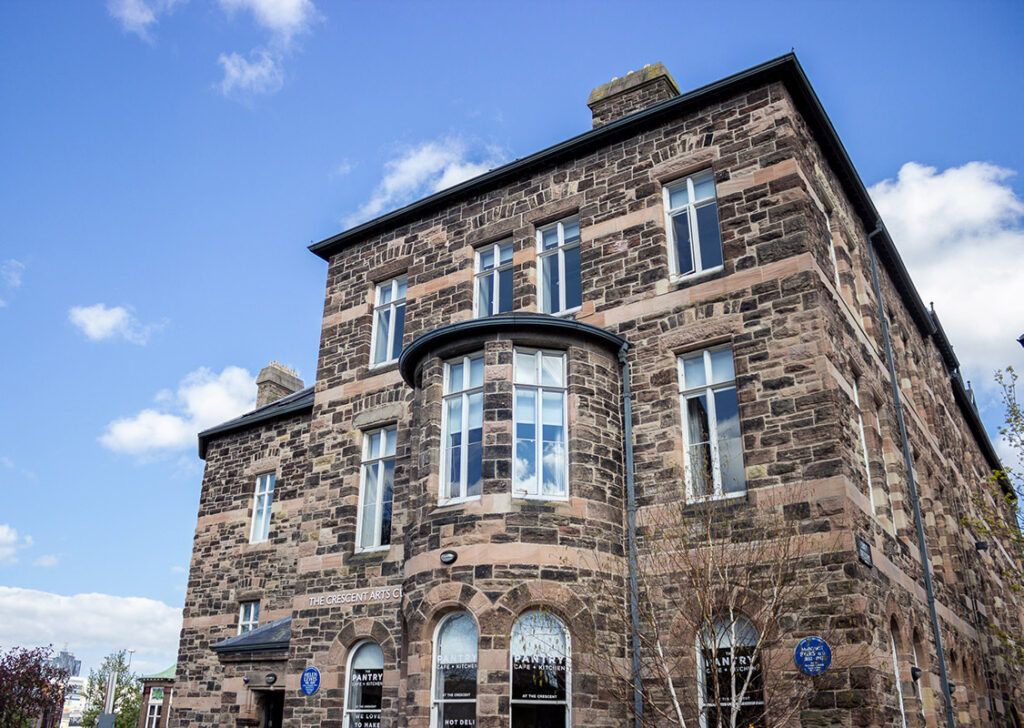
Holding Hands with my Teenage Self at the Crescent Arts Centre
by Cara Leahy
When I was a teenager, I was a proud member of the Crescent Arts Youth Theatre. Every Saturday, we would meet in the Helen Lewis Dance Studio, and we would rehearse, laugh, rehearse some more, and then we would leave. I left when I was eighteen, to move to Glasgow for university: I haven’t performed since, choosing instead to leave that part of myself behind, resting in the green room near The Cube.
When I was selected as one of the Young Writer Delegates, I was most excited to reconcile the two parts of my creative life in the building that I came of age creatively: I wanted Cara, the “actor” with too much shame to meet Cara, the “writer” with probably not enough shame. I prayed we would get along. I think teenage Cara would think this new version was cool, though she would be displeased to find out that I am still cutting my own hair at twenty-two, and I am still working in hospitality – but need’s must. She will get over it, it’s her life too.
On the day of the showcase, I relied on actor Cara to come forward. I needed her confidence, her ability to compartmentalise and just do it, but I needed to do it without shame. I needed to be able to give myself over to the audience, without fear of embarrassment. So, with shaking legs, I read. It went well but I was nervous. Having to follow Jasmin, Mary, and Finn was intimidating. They are all brilliant – I can only hope to be even half as talented someday. Getting to work closely with them was an honour and a privilege – they are all completely inspiring.
Getting to be a small part of the festival was a similar honour. It was incredible to hear readings from Lucy Caldwell, Wendy Erskine, Aingeala Flannery, and Marie Howe. I haven’t felt as creatively fulfilled since before university: it felt good to be surrounded by other writers and people that love literature as much as I do. The festival made me feel hopeful and excited. It made my aspirations feel tangible and real.
The festival was also just fun. It was fun to meet people my age that want to do the same thing. It was nice to talk about writing and not feel judged. It often feels like telling people you want to be a writer must come with a self-deprecating joke about unemployment or a disclaimer about how you have something different and new to say or to outright declare how talented you feel you are (something I loathe to do). None of that was necessary because everyone understood. It felt very liberating.
I would like to extend my thanks to the Irish Writers Centre, the Crescent Arts Centre, and Deirdre Cartmill. This was an amazing experience and I feel so lucky that I was selected. It was an incredibly worthwhile experience; I had the best time.
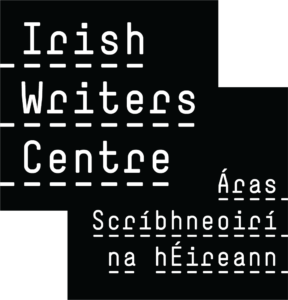
Each year, the Irish Writers Centre runs up to 20 free and exciting programmes to support writers’ development. Carrying our it’s work on an all-island basis, the Irish Writers Centre offers a range of support schemes, residency opportunities, mentoring, and other development programmes. View more opportunities for writers here.
Join our mailing list to receive weekly updates straight to your inbox. We will keep you informed of what’s on at the Centre, including the current opportunities we have for writers, our events, the latest creative writing courses, resources for writers at all stages, and other news you’ll want to know.

